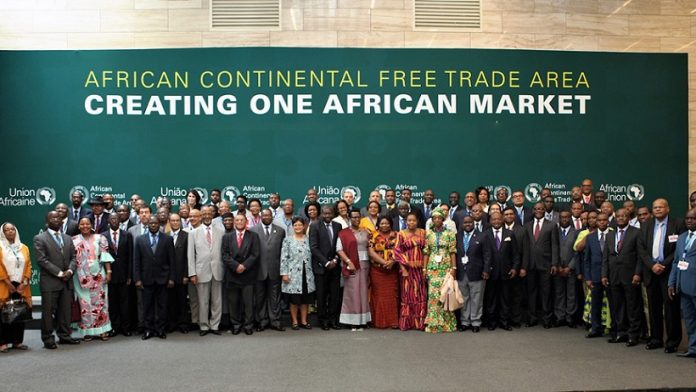The World Bank believes that a Continental Free Trade Area will have beneficial effects for Africa. Not so much by itself as by what it entails in terms of economic reforms, productivity gains, and better governance.
The World Bank publishes a voluminous report extolling the merits of the expected AfCFTA (African Continental Free Trade Area). Which represents “a real opportunity” to boost growth, reduce poverty and expand economic inclusion on the continent.
“The Zone has the capacity to increase employment opportunities and income, which helps broaden the prospects for all Africans,” said Albert Zeufack, WB chief economist for Africa. Which takes up the main conclusions of the report: “The Zlecaf should help lift around 68 million people out of moderate poverty and make African countries more competitive.”
Nevertheless, admits the economist, the success of its implementation will be paramount. “In particular, its effects on all workers – women and men, skilled and unskilled – in all countries and sectors will need to be carefully monitored to ensure that the agreement bears full fruit.”
According to WB calculations, the Zone would, all other things being equal, increase Africa’s revenues by $450 billion by 2035 (an increase of 7%) while adding $76 billion income in the rest of the world.
African exports could increase by $560 billion, mainly in the manufacturing sector. Properly conducted, the ZLECAf would promote greater wage growth for women (+10.5%) than for men (+9.9%). And more important for the wages of unskilled workers (+10.3%) than skilled workers (+9.8%).
Extreme poverty would decrease across Africa, especially in areas where poverty rates are high today. West Africa in particular: the World Bank calculates that 12 million people would be lifted out of extreme poverty, more than a third of Africa’s total.
The decline is estimated to be 9.3 million in Central Africa, 4.8 million in East Africa and 3.9 million in Southern Africa. For example, in Guinea-Bissau, the poverty rate would drop from 37.9% to 27.7%; in Mali, the rate would drop from 14.4% to 6.8%; in Togo, from 24.1% to 16.9%.
Cost reduction!
Of the 450 billion dollars in additional revenue generated by the AfCFTA, 292 billion would come from the strengthening of trade facilitation measures. They aim to remove bureaucratic brakes and simplify customs procedures.
Thus, the liberalization of customs tariffs would constitute an important step. However, it would only increase incomes by 0.2%, if it were not accompanied by other measures to facilitate trade. It will be necessary, recommends the WB, to cut red tape, simplify customs procedures and promote the integration of African companies into global supply chains.
Economists do not hide that these improvements “will require significant efforts” on the part of the countries which will have to ease the customs constraints weighing on businesses and traders.
Economists calculate that customs clearance time could decrease by 32% in Nigeria, 24% in DR Congo, 18% in Cameroon, 9% in Ivory Coast, etc. With, as a corollary, a reduction in induced costs of around 10%. For countries like Morocco, Tunisia, Senegal, the benefit would be much less.
As much as a prospective study of the benefits of free trade in Africa, the World Bank report is intended as a guide to good practice. He thus specifies that the creation of a continental market will require “proactive action to reduce all trade costs”.
Laws and regulations will need to be adopted that allow goods, capital and information to cross borders freely. Countries will need to create a competitive business environment capable of stimulating productivity and investment, and promoting competitiveness vis-à-vis abroad as well as foreign investment. These provisions will improve the productivity and innovation of African businesses.
Admittedly, in the short term, the application of the AfCFTA could result, in “some sectors”, by job destruction. Governments will then have to set up safety nets and suitable retraining mechanisms. In fact, governments will need to design policies to better prepare their workforce to take advantage of new opportunities.
Increase in State revenues, over time!
At first, the impact of AfCFTA on tax revenue will be low for most countries. Customs revenues would fall by less than 1.5% for most, with the exception of the Republic of Congo (-3.4%) or DR Congo (-2.1%).
First, imports from African countries represent a small share of tariff revenue for most countries (less than 10% on average). Second, most tariff revenues can be protected from liberalization by excluding certain lines.
In the medium term, the overall impact on import tariff revenues is expected to be positive, in the AfCFTA scenario, at the regional level. Although tariffs are falling, the increase in the volume of imports leads to a higher collection of tariff revenues. Which would increase by 3%, more if economic growth is better than expected.
Building resilience!
The realization of the potential of the AfCFTA will necessarily be delayed, due to the Covid-19 pandemic. Which is expected to cause up to $79 billion in production losses in Africa in 2020 alone. The World Bank finds that the coronavirus has caused major disruptions in trade on the continent, particularly for essential goods such as supplies medical and food.
Therefore, by developing regional trade, lowering the cost of trade and streamlining border procedures, “the effective implementation of the agreement will help African countries build their resilience.” Its implementation will promote the substantive reforms needed to stimulate long-term growth.
“The creation of a single continent-wide market for goods and services, business and investment will restructure African economies,” said Caroline Freund, director of the Trade, Investment and Competitiveness cluster. “The implementation of the AfCFTA would be a big step forward for Africa, showing the world that the continent is emerging as a leader in promoting global trade.”































